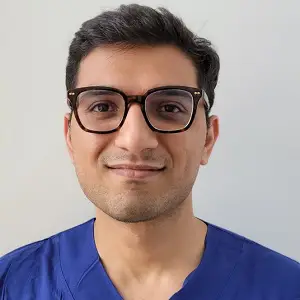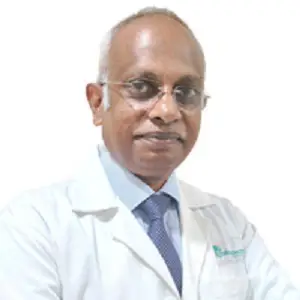When is a Neck Pain Surgery Done?
November 12, 2022
Worried about neck pain that won't go away with any home remedy? It has become a common phenomenon in individuals of all age groups. Not only does it cause pain and discomfort, but neck pain also leads to disability in the long run and may need surgery. Learn about the types of neck pain and when one needs to opt for surgery for a better prognosis.
Neck pain and its types
Neck pain is characterized by pain, discomfort, tingling and numbness starting from the base of the head down into the neck and may spread to the arms and hands.
The various types of neck pain include:
-
Cervical Radiculopathy: When a bulging spinal disc starts compressing the structures around it, especially the nerves that move out from the same area, it leads to nerve compression. There is pain with tingling and numbness in the arms and hands up to the fingers (radiculopathy).
-
Postural neck pain: Neck pain is caused due to altered body posture, particularly the head, neck, chest and shoulders, and muscle strain due to faulty posture during an activity.
-
Cervical stenosis: The space around a cervical spinal disc may reduce (stenosis or narrowing) considerably, causing compression on the disc, nerves and bones, leading to symptoms of cervical radiculopathy and may worsen to become cervical myelopathy.
-
Neck injuries: Road traffic accidents and any jerk or violence may cause injuries to the neck like bone fractures, spinal cord injury, muscle and ligament tears and nerve injuries.
-
Cervical myelopathy: When cervical stenosis (narrowing of the cervical canal) worsens over time, it may cause damage to the spinal cord. There is a progressive loss of balance and weakness in all limbs with involvement of the bowel and bladder.
What are the leading causes of neck pain?
Neck pain can originate from the cervical (neck spine) bones, muscles, ligaments, nerves, spinal disc and surrounding joints.
-
Altered posture: Sitting, standing or working in faulty postures can cause neck pain.
-
Muscle strain: Lifting heavy weights and repetitive and jerky movements may lead to muscle strain causing neck pain.
-
Injuries around the neck and shoulder
-
Other causes of neck pain: Meningitis (inflammation of brain covering), heart attack, migraine, headaches, rheumatoid arthritis, osteoporosis, birth abnormalities, cancer etc.
Signs one needs neck surgery
Most cases of neck pain resolve with medications, physical therapy and precautions during daily activities. But a few do not respond to conservative methods and need neck surgery. Some of the signs that are indications for surgery include:
-
Progressive nerve compression and age-related degeneration need surgery.
-
Numbness, weakness and loss of sensation in limbs
-
Neck fractures and injuries requiring stabilization
-
Scoliosis or abnormal bending and twisting of the cervical spine
All about neck surgery
Surgical options for treating neck pain are:
-
Anterior cervical discectomy and fusion (ACDF): The protruding disc causing nerve compression is removed using an incision on the front (anterior) part of the neck, and the spinal vertebrae are fused using bone cement or bone graft. This helps stabilize the cervical segment causing neck pain but causes limitations in neck movements.
-
Cervical laminectomy: This procedure involves removing the segment of the lamina (part of the cervical vertebra) to decompress or create space for the cervical disc and nerve. This relieves pressure on the nerve, thus reducing neck pain.
-
Artificial disc replacement (ADR): A damaged or diseased cervical disc is completely removed through an incision on the front part of the neck. The space between the two vertebrae is filled with a metal or plastic implant. The vertebrae are not fused, thus retaining movements of the neck.
-
Posterior cervical laminoforaminotomy: This surgery reduces pressure on a compressed cervical nerve. The incision is made on the back part of the neck. The spinal lamina and the foramina are decompressed. The cervical vertebrae are stabilized but not fused, allowing neck movements.
Recovery after neck surgery
-
After spending a few days in the hospital, patients are discharged and asked to avoid strenuous activity at home.
-
Doctors provide pain medications and book follow-ups.
-
Patients must wear a cervical collar for a few weeks to help support the structures around the neck.
-
Doctors advise physical therapy sessions to learn about general strengthening and specific neck muscle exercises.
-
Light activities of self-care and home can be resumed within three weeks.
Neck pain is treatable!
Neck pain, due to posture, muscle strain and mild age-related changes, can be managed easily. But, severe cases of cervical radiculopathy, injuries, and myelopathy may need surgery. It helps fuse cervical vertebrae and decompress the spinal structures. One must consult a spine surgeon to review the best options for neck pain treatment.
Dr. Utkarsh Prabhakar Pawar
MBBS, MS, DNB...
| Experience | : | 5 Years |
|---|---|---|
| Speciality | : | Orthopaedics and Trauma |
| Location | : | Mumbai-Chembur |
| Timings | : | Mon - Sat : 1:00 PM to 3:00 PM |
Dr. Kailash Kothari
MD,MBBS,FIAPM...
| Experience | : | 23 Years |
|---|---|---|
| Speciality | : | Orthopaedics and Trauma |
| Location | : | Mumbai-Chembur |
| Timings | : | Mon - Sat : 3:00 PM to 8:00 PM |
Dr. Om Parshuram Patil
MBBS, MS – Orthopaedics, FCPS (Ortho), Fellowship in Spine...
| Experience | : | 21 Years |
|---|---|---|
| Speciality | : | Orthopaedics and Trauma |
| Location | : | Mumbai-Chembur |
| Timings | : | Mon - Fri : 2:00 PM to 5:00 PM |
Dr Ranjan Burnwal
MS - Orthopedics...
| Experience | : | 10 Years |
|---|---|---|
| Speciality | : | Orthopaedics and Trauma |
| Location | : | Mumbai-Chembur |
| Timings | : | Mon - Sat: 11:00 AM to 12:00 PM & 6:00 PM to 7:00 PM |
Dr. Sudhakar Williams
MBBS, D. Ortho, Dip. Ortho, M.Ch...
| Experience | : | 34 Years |
|---|---|---|
| Speciality | : | Orthopaedics and Trauma |
| Location | : | Chennai-MRC Nagar |
| Timings | : | Tue & Thur : 9:00 AM to 10:00 PM |
The average cost of neck pain surgery is approximately Rs. 2-5 lacs depending upon the complexity and requirements of the surgery.
The total recovery time required after neck pain surgery is two to three months. Patients can carry out light activities after three weeks.
A spinal disc may protrude between the vertebrae and may eventually progress to cause complete prolapse of the disc due to age-related changes, injury or muscle strain.
The hospital stay after neck surgery is between two days and a week, depending on the type of surgery.
The best comforting position after neck pain surgery is either on the back or one side with a pillow below or between the knees.
Yes, walking is a good form of exercise after neck surgery. You should take care to gradually increase your walking distance and speed.
Physiotherapy is often prescribed after neck surgery to help you get back into your normal routine.
NOTICE BOARD
CONTACT US
CONTACT US
 Book Appointment
Book Appointment








.svg)
.svg)
.svg)
.svg)








